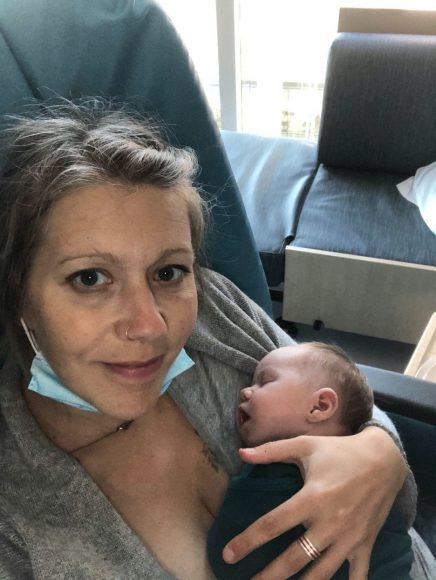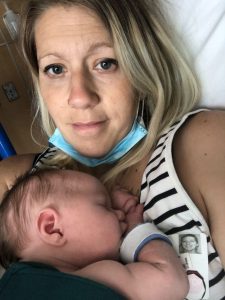The NICU is a special place. At first, it’s scary and overwhelming. Most of us are not expecting our newborn baby to need hospitalization in the baby intensive care unit. Most of us don’t know anything about it; not what it looks like, not who works there, not what to expect in terms of decisions to make, medical team meetings to attend, and how to advocate to ensure your baby gets what they need. And most of us have never even heard of donor milk or know why it’s a lifesaving measure for so many fragile infants in the NICU.

When I delivered in May 2020, right at the start of the pandemic, I expected to have my baby and go home as soon as possible. There were no issues with my pregnancy or delivery. Our baby, Otter, was not born early and had no foreseen medical issues. Until they checked his blood sugar. It was dangerously low, and if not treated, this can lead to seizures and even death. They explained he would need IV dextrose and to be monitored closely until they could figure out what was going on.
It was a whirlwind 22 days. He developed a staph infection, requiring IV antibiotics and lots of blood draws and cultures, but ultimately was able to clear the infection and the blood sugar issue. They were never able to determine what had caused it and labeled it ‘transient hypoglycemia. That was that. He is now 21 months, and besides needing some in-home therapy for sensory issues and speech, he is a thriving, joyful, active toddler.
When you are thrown into the NICU, you are usually not ready, physically, to provide your baby with breastmilk. Your body, especially if the baby is born early, has not started the process for milk creation and it can take days or weeks for that to occur. Donor milk can be given to infants in this case, and provides a preemie with everything they need to keep fighting and growing. Human milk saves lives.
Click Here for Drop-off Video!
How to Become a Milk Donor
To get started with your first milk donation, complete a short online screening at themilkbank.org/give-milk. From there, you’ll hear from the donor team who will walk you through the rest of the process. You can expect to submit a health questionnaire, provide contact info for your healthcare provider, and complete a blood test. Every step of the donation process ensures that milk is safe for very fragile preemies and sick babies.
Once approved, you can donate milk at convenient drop-off locations in your community or request pre-paid shipping supplies from The Milk Bank.
Either way, your milk donation will serve as lifesaving nutrition for preemies. You can choose to donate milk until your infant’s 2nd birthday. Each ounce of milk you donate can provide up to 3 feedings for the tiniest tummies in the NICU! You’ll join a community of moms who give back to their community in a unique, special way.
The Milk Bank is especially honored to work with parents and families who have experienced infant loss and choose to donate any amount of milk. If you are interested in learning more about this program, please visit themilkbank.org/donate-after-a-loss.

Written by Kristen Tippet, a St. Louis area mom and Milk Donor for The Milk Bank about her NICU experience and milk donation journey.










